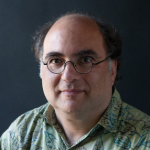by Rona | Jun 23, 2017 | Announcements, Appearances, KPFA, Podcasts, Radio Shows

Listen now to todays show on About Health (June 26th) on @KPFA for a conversation about Dementia and the Brain.
Dementia is an overall term that describes a wide range of symptoms associated with a decline in memory or other thinking skills, severe enough to reduce a person’s ability to perform everyday activities. Alzheimer’s disease accounts for 60 to 80 percent of cases. Vascular dementia, which occurs after a stroke, is the second most common dementia type. But there are many other conditions that can cause symptoms of dementia.
 Josh Kornbluth, is currently engaged in a year-long residency as a scholar at the Global Brain Health Institute. He is spending his time with people who have dementia and their caregivers, as well as researchers, nurses, social workers, and others.
Josh Kornbluth, is currently engaged in a year-long residency as a scholar at the Global Brain Health Institute. He is spending his time with people who have dementia and their caregivers, as well as researchers, nurses, social workers, and others.
Described as a cross between Woody Allen and Spalding Gray, Josh Kornbluth has been performing autobiographical one-man shows since 1987. The San Francisco Chronicle declared, “Kornbluth takes a world we ignore, or barely observe, and brings it into brilliant comic relief.” He launched his career as a solo artist with Josh Kornbluth’s Daily World, in which he described his childhood as the son of communists in 1960s New York. He is currently working on a solo show based on his experiences as an artist-in-residence and volunteer at the Zen Hospice Project in San Francisco. For two years he hosted an interview program, “The Josh Kornbluth Show,” on KQED TV. His latest feature film, Love & Taxes, is his second in collaboration with his brother Jacob; in a review, Variety called him “a nerd for our time.” His first feature film, Haiku Tunnel, is currently on HBO. Check out his web site at http://joshkornbluth.com/
 Dr. Jennifer Yokoyama is an Assistant Professor at the UCSF Memory and Aging Center, where she is building an independent research program in neurogenetics of aging. More specifically, she is interested in how genomic variation influences brain anatomy, physiology, and cognitive behaviors in healthy older adults, and how genomic variation relates to vulnerability, as well as resilience, against neurodegenerative processes of aging. Dr. Yokoyama obtained her doctorate degree in Pharmaceutical Sciences and Pharmacogenomics in 2010 at UCSF and completed her postdoctoral training in neuroimaging at the UCSF Memory and Aging Center.
Dr. Jennifer Yokoyama is an Assistant Professor at the UCSF Memory and Aging Center, where she is building an independent research program in neurogenetics of aging. More specifically, she is interested in how genomic variation influences brain anatomy, physiology, and cognitive behaviors in healthy older adults, and how genomic variation relates to vulnerability, as well as resilience, against neurodegenerative processes of aging. Dr. Yokoyama obtained her doctorate degree in Pharmaceutical Sciences and Pharmacogenomics in 2010 at UCSF and completed her postdoctoral training in neuroimaging at the UCSF Memory and Aging Center.



 Dr. Jennifer Yokoyama is an Assistant Professor at the UCSF
Dr. Jennifer Yokoyama is an Assistant Professor at the UCSF